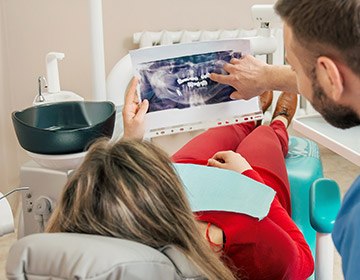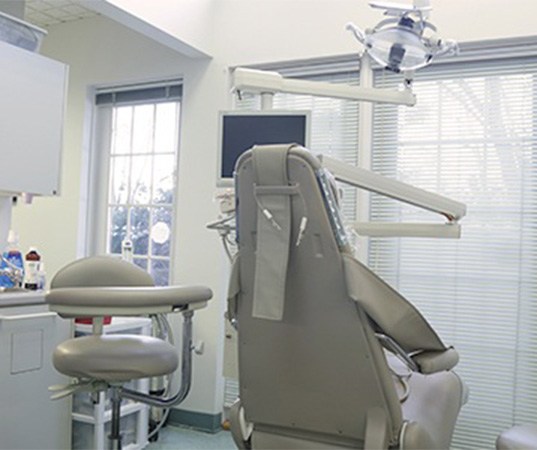


A Team Approach To Excellent Dental Care
At Willow Run Dental Association, our patients’ needs will always come first. That is why we are proud to offer the services of three dentists who closely work together in order to offer a wider range of treatment options and truly exceptional improvements for your oral health and happiness. We want to earn your family’s trust through our collaborative efforts and hopefully welcome you in again and again.
 Dental Director
Dental Director
5-Star Dentistry & Happy Patients
“Everyone is friendly, professional and goes out of their way to explain exactly what they are doing &
what your options are! Over the years, Dr. Schneider & her staff have been a godsend. Shannon has
cleaned my troublesome teeth with a gentle and patient hand. I can not recommend this team highly
enough... 5 stars!"
Lewiston, ME
"I moved to the L/A area 3 years ago and it was past time I found a new dental practice. I checked a few
places online and decided on Willow Run. Man, am I glad I did! Everyone is friendly and courteous. My
hygienist Jennifer explained everything on the first visit, and Dr. Schneider was also friendly and
quite informative."
Lewiston, ME
"Extremely polite and friendly staff. Very good at what they do. I've been going here all my life and I
never plan to go elsewhere. I have extreme anxiety, the calm, friendly demeanor of everyone there really
helps to put me at ease."
Auburn, ME

Over 75 Years Of Combined Dental Experience
Our dental team in Auburn has an impressive history of outstanding patient care. Combined, our time spent working in the world of dentistry spans over 75 years – and we have no intention of stopping anytime soon. Giving patients of all ages plenty of new reasons to smile is our passion! We love getting to know you and your loved ones well and helping everyone feel genuinely at ease throughout each dental appointment, consultation, and procedure.
New Patient Offer
& Cleaning
Request An Appointment
Dental Insurance & Financing
We strive to make the payment process as simple, straightforward, and stress-free as possible for individual patients and families. If you have dental insurance, we will file any claims on your behalf and use our knowledge of the system to maximize reimbursements – you won’t have to lift a finger! Alternatively, affordable payment plans can be arranged to break down the cost of more extensive treatments into manageable sections.
Featured Dental Services
Family Dentistry for Smiles of All Ages
As part of a busy family, you are surely juggling all sorts of priorities in everyday life – work, school, sports, afterschool clubs, dinner, and much more. Finding time for regular dental care can seem impossible at times, especially if you need to drive to several different practices. At Willow Run Dental Association, we love saving our patients valuable time by accommodating children and adults alike in one convenient nearby location, providing the essential care that smiles at every stage of life need to thrive.
Dental Crowns & Bridges Rejuvenate Your Smile
No one wants to experience a damaged or incomplete tooth, but these situations can happen to anyone. Thankfully, our Auburn dental office has the gentle touch and compassionate approach that patients need most when their smiles are not at their best. We offer several restorative solutions that can replenish important dental structure seamlessly, including custom-made crowns and bridges. The finished result will be durable, highly functional, and built to last for many years at a time.

Dental Implants Replace Missing Teeth
Without a full set of teeth, patients may struggle to eat their favorite foods, chat with friends, or even smile for photographs without embarrassment. At Willow Run Dental Association, we want to help you regain what has been lost in a truly exceptional way – that is why our dentists strongly recommend dental implants. Implants are the premier solution to tooth loss today because of their state-of-the-art structure. They replicate every part of the natural tooth, resulting in unmatched durability and aesthetic value. They can easily last for the rest of the patient’s life!

Cosmetic Dentistry Get Your Dream Smile
Your smile is the clearest extension of your unique personality, and our team wants to help patients achieve the look they want and deserve. If you are currently unhappy with your teeth because of stains, chips, cracks, gaps, or crookedness, please do not hesitate to let us know. Our menu of dental services features several cosmetic dentistry options that are specifically designed to correct these frustrating flaws and create the beautifully confident image you deserve. We can determine which options best fit your personal goals and preferences during an initial consultation.

Emergency Dentistry In Pain? Call Us!
Dental emergencies can happen suddenly and cause a great deal of worry, especially when your child or spouse is the one in pain. Thankfully, dedicated emergency dentistry assistance is available at Willow Run Dental Association. Please do not hesitate to contact our dental practice right away if you are experiencing a severe toothache, knocked-out tooth, or similar urgent situation. Our team will make every effort to accommodate you as soon as possible, relieving pain and providing restorative care as needed to bring back your healthy and complete smile.
Learn About Emergency Dentistry
Frequently Asked Questions From Patients in Auburn
Calling our office would be the quickest and most convenient ways to get the answers you need for any questions or concerns you might have. That said, we’re aware that many people prefer researching online, or they are simply too busy during the day. To make it easier to get the information you need, our team has compiled and answered several of our most commonly asked questions from our patients in Auburn and the surrounding communities. Give us a call to schedule an appointment or read on to learn more!
How Do I Find the Best Place to Get Dental Work Done?
The best place for you to undergo dental treatment will depend on what you think is important. This can involve a mixture of factors, such as location, hours of operation, payments/insurance, safety, and professional credentials. You should also know what kind of service(s) you are interested in or need, such as if you want to improve your pearly whites with cosmetic dentistry or require a dental implant as a tooth replacement. Certain practices will be a better fit than others. For instance, other dentists may refer patients out for dental implants while our team can perform the entire process in-house. Lastly, get familiar with the practice and their philosophy toward dental care, as you’ll want to be comfortable and confident with the team you’ll be receiving treatment from.
How Do I Get Emergency Dental Care?
Always call your emergency dentist if you suspect you have an urgent dental situation at hand. Someone on our team should be able to help pencil you in for the earliest appointment possible. Don’t forget, however, that you’ll need to visit your local ER for more dire situations, such as trouble breathing/swallowing, a broken/dislocated jaw, and uncontrollable bleeding. They might not address the dental situation but they can at least keep you safe and pain-free until we can help you. Our office offers same-day emergency visits, that way you can be more likely to receive the necessary treatment at a moment’s notice. Also, keep in mind that many dental emergencies are signs of “bigger” underlying issues, so it’s important to visit your dentist regularly so that they can address any they might detect early on.
How Much Does it Cost to Get a Tooth Extracted Without Insurance?
While this can vary based on factors like geography and a person’s dental health, the cost of tooth extractions can typically range between $150 and $400 across the United States. Wisdom tooth extractions also come with a higher price compared to normal ones, as they often require help from an oral surgeon. You might also expect additional expenses based on the complexity of your procedure, which can raise the overall price. If you are insured, then you may have your fees negotiated by your dentist and provider.
What Do You Do If You Can’t Afford a Dentist?
Remember that dental care is mainly about prevention, so you should maintain good oral hygiene every day and schedule checkups and cleanings every six months to save money. Dental insurance is another great tool for minimizing your out-of-pocket expenses, and our team will be more than happy to help you navigate your policy and file claims on your behalf. Our office also accepts Essential Dental Plan memberships so that you can enjoy discounts on many of our services, as well as special promotions that can help you save money on certain treatments. We’re also partnered with CareCredit—a third-party financier that can break up the total price of care into monthly installments that come with little-to-no interest. Speak with our team if you want to explore money-saving opportunities so you can focus on treating your smile stress-free!


